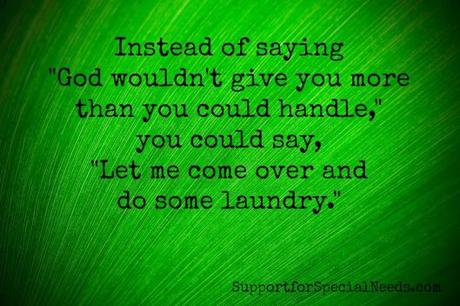
- God will never give you more than you can handle. While perhaps theologically correct, it is singularly unhelpful to the person who is neck-deep in a crisis, trying to swim against a Tsunami. A wonderful phrase recently came from Support for Special Needs. They suggest changing this from “God will never give you more than you can handle” to “Let me come over and help you do some laundry.” This strikes me as even more theologically correct.
- It gets better. Yes, yes it does. But right then, it’s not better. And before it gets better, it may get way worse.
- When God shuts a door, he opens a window. Maybe, but maybe not. Maybe he just shuts a door. Maybe there is no window. There was no window for Job. There was a cosmic battle that raged as he sat in distress. There might not be a window.
- Did you pray about it? Again – theologically correct. “Don’t worry about anything, instead, pray about everything…” but in a crisis, you don’t heap guilt onto pain and suffering. Pray for the person, but please, please leave the clichés at home.
- God is good – all the time. Another one that is technically theologically correct. But is it helpful to say this when someone has just lost a child and is screaming at Heaven? Is it helpful to say this to the person who just had their fifth miscarriage? Is it helpful to say this to the woman going through a divorce, because her marriage could not hold up under the stress of a special needs child? They may say it, and we can nod our heads in agreement. But for us to say this from a place that is calm and safe will probably not be helpful.
- But for the grace of God go I. “But why you? Why do you get that grace and not me? Why am I the one in the crisis? Was God’s grace witheld from me?” Those are valid responses to that phrase. I understand the phrase, and I’ve used it myself, but it doesn’t help the person who is in deep pain.
- Don’t worry. God’s in Charge. Yeah? Well, he’s not doing a very good job then is he? God is in control, but it brings up some serious theological implications about God’s role in the crisis. Instead of a theology of suffering, we might want to think about a fellowship of suffering.
- Maybe God needed to get your attention. Thank God no one ever said this to me during times of crisis – because I might have to punch them in the face with a knife. That’s all.
- Maybe it happened for a reason. Remember what I said about punching someone in the face with a knife? Yeah – that.
- Just call me if you need anything. While I want to appreciate this, the fact is that people in crisis usually don’t have the ability to call, so they won’t. Even if you don’t know someone well, you can bring them a meal or drive them somewhere.
The best analogy I have for people in acute crisis is looking at them as burn victims. Caring for burn victims is divided into three stages that overlap.
The first is the emergent or resuscitative stage. At this stage priority is given to removing the person from the source of the burn and stopping the burning process. The big things to think about are fluid replacement, nutrition, and pain management.
The second stage is the acute or wound healing stage. At this stage, the body is trying to reach a state of balance, while remaining free from infection. During this stage, patients can become withdrawn, combative, or agitated. This stage can be a lengthy and unpredictable stage. Burn victims, like people in crisis, often lash out at those closest to them.
The final stage is the rehabilitative or restorative stage. The goal at this stage is for a patient to resume a functional role within their family and community. Reconstruction surgery may be needed. Encouragement and reassurance are critical to the person at this stage.
Burn care has a lot to teach us about loving and caring for people in crisis. And those who care for burn victims rarely use clichés — they are too busy caring.
In February, I wrote a piece called Toward a Fellowship of Suffering, and I’ll end what could be a cynical post, with words from that piece.
“There is something about suffering that longs for someone to sit with us through the pain. It’s the fellowship of suffering. It’s the words ‘you are not alone’ put into action. The sitting bears witness to our pain. More than a card or a casserole the familiar, patient presence of another says to us ‘it’s too much for you to bear, but I will be with you, I will sit with you.'”

